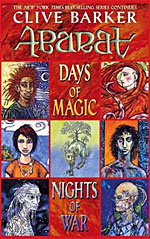
![]() verkisto
verkisto
7/26/2016
![]()
When I re-read Abarat, I read the mass-market paperback printing of the book. This wasn't really such a big deal; all the text from the original novel was there, so I wasn't missing any of the story. I was all set to move on to Days of Magic, Nights of War in the same fashion, but I stumbled across the trade paperback, complete with Barker's illustrations, in a used bookstore and decided to read it in full illuminated fashion.
While the illustrations add something to the story, I don't know that they're necessary. Abarat felt more vivid than Days, despite the fact that the former was just text, and the latter was illustrated. I can't say for sure if that's because of the story (when I first read Abarat, ten years ago, it was the illustrated version, so it's not like I've never been exposed to the artwork), but the first novel felt much more memorable than the second. At the very least, my memories of the first were stronger than the second, insofar as what I recalled before re-reading them.
The strange thing is that more stuff happens in this book, but it didn't feel as engaging for some reason. Part of me felt like Candy wasn't developed well enough to carry much of what happens in the story. In the first book, it was mostly a story of discovery and imagination, and Candy was carried along by it all. In this book, Candy becomes the focus, as she's dealing with missing her mother and solving the mystery of why Abarat feels so familiar to her, while dodging Christopher Carrion and his attempts on her life. Unfortunately, Candy never seemed to rise up to that importance. She felt flat, partly because her struggle with wanting to stay in Abarat while not wanting to put anyone else she liked in danger (to say nothing of her missing her mother) simply wasn't convincing enough. Despite the logical reasons for her wanting to leave, I never bought it.
In addition, I didn't understand why Candy had any brothers. Neither of them felt at all developed (less so than Candy, even), and I didn't see that they played any part in the events of either story. The dynamic of Candy, her mother, and her father seemed to be strong enough to create the right conflicts, so why bring in the brothers at all if they don't make any difference in the story? It was puzzling.
Though there's more action in this novel, the story is more about giving us a little more detail about what the overarching story is about. We get a big reveal about Candy, and understand more what ties her to Abarat, which moves us forward through the story, but it feels like it's padded out a lot. The story sets up what's to come without being exposition, which might be another reason why the story feels a little odd and unmemorable.
Despite all that, I'm interested in the rest of the story. As I mentioned with Abarat, Barker's imagination carries the story well, so it's hard not to want to see what happens next. I just hope Candy develops more in the next book.